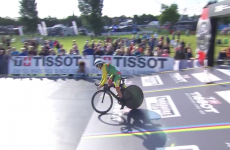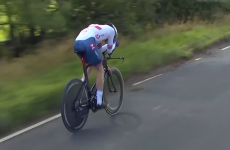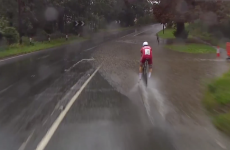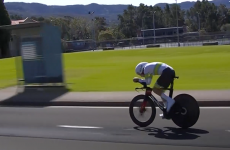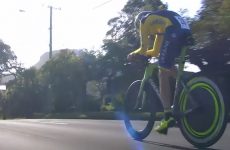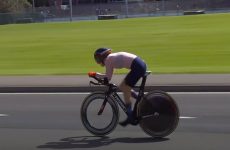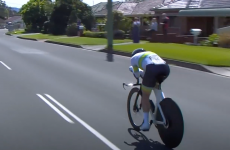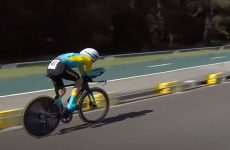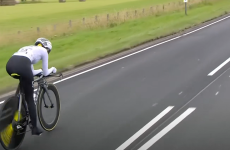Description
August 5, 2023
World Championships 2023 🇬🇧 – Road Race MJ – Glasgow – Glasgow : 127,7 km
This summer, Glasgow, Scotland is hosting the first-ever combined UCI World Championships,
Show more...
August 5, 2023
World Championships 2023 🇬🇧 – Road Race MJ – Glasgow – Glasgow : 127,7 km
This summer, Glasgow, Scotland is hosting the first-ever combined UCI World Championships, bringing together almost every UCI-sanctioned discipline for one big super event this August. From road racing to artistic cycling, more than 200 rainbow jerseys will be given out in 13 different disciplines across the 11 days of action in and around Glasgow. The combined Worlds are a new initiative from the sport’s governing body, the UCI, and are set to take place every four years, with normal, separate World Championships carrying on as usual in the intervening years. Probably the most familiar discipline to many of you, road cycling will be the main event at the World Championships. In Glasgow, the road races are starting in various locations outside of Glasgow, before heading into the city to take on a tricky finishing circuit. It’s important to note that the Worlds are raced in national teams, rather than trade teams, so expect to see a very different-looking set of jerseys. Team sizes are determined based on the nation’s world rankings, which can lead to big WorldTour stars only having a small team around them if they are from a smaller cycling nation.
Albert Philipsen (Denmark) added the junior road world title to his European cross-country mountain bike title and Danish national cyclo-cross, road race and time trial titles, confirming his huge cycling talent.
The 16-year-old Dane was part of the decisive seven-rider break that escaped early before attacking solo with just over a lap to go to blast around the final lap and win alone in central Glasgow.
Paul Fietzke (Germany) beat Felix Ørn-Kristoff (Norway) in a close sprint for the silver medal after a thrilling road race during the nine laps of the twisting Glasgow city centre course.
Italy’s Juan David Sierra (Italy) lost his chain on the final climb of Scott Street but fought back to finish fourth, just ahead of Theodor Storm (Denmark), who played a key role in Philipsen’s solo victory.
At 16 years, 11 months and 2 days old, Philipsen is apparently the youngest ever junior men’s road race world champion. Yet he seemed far more mature and far stronger than his age.
“Our plan with the Danish squad was to race quite offensively,” Philipsen explained calmly. “We tried to make the race hard and we got in an early breakaway and I was joined by the other strong Danish guy Theodor.
“Then we had some really good teamwork in the group of seven guys. Then on the second to last lap, I did a little attack and got a gap, so I knew that when I went, I’d be able to get away. I waited patiently for the right moment and then went full gas from there.
“I felt really good out there, I felt I wasn’t really getting tired after the laps, I felt like I’d just started. It’s something I’ve been dreaming of and working towards for so long, that it’s crazy to finally have happened.”
HOW IT UNFOLDED
The morning rain that soaked the junior women’s race dried quickly and so the 154 junior men fortunately started their 127.3km race and nine laps of the twisting Glasgow circuit in the dry. The USA’s lead rider AJ August was a late withdrawal due to illness the night before the race.
Dutch rider Viego Tijssen was the first to attack but everyone wanted to race and stay up front on the testing circuit, sparking a chase and a series of early crashes.
When a mechanical problem slowed Tijssen, Felix Ørn-Kristoff of Norway went clear. Australia, Slovenia and the Netherlands led the chase with Norway trying to block the chase.
Bruno Kessler (Germany) and Thom van der Werff (Netherlands) crashed on a corner and soon after others slipped out or touched wheels, The peloton was lined out and split after just two laps of the Glasgow circuit.
Philipsen powered across to Ørn-Kristoff with Jørgen Nordhagen of Norway and Paul Fietzke (Germany) with 90 km to go. Matthew Brennan (Great Britain), Juan David Sierra (Italy) and Theodor Storm (Denmark) eventually crossed to the attack, meaning there were seven riders up front.
Belgium missed the move and so were forced to chase with five laps to race. Australia’s Oscar Chamberlain was hit by a mechanical problem and so also had to use vital energy to chase back to the peloton, hurting his and Australia’s chances.
The seven led by 1:00 with 60km to race as Belgium’s Steffan De Schuyteneer tried to chase alone, knowing the 30-rider peloton had little chance of getting back into the race for the rainbow jersey and medals.
France, Belgium and Slovenia then tried to lead the chase and the gap gradually fell to 30 seconds with three laps to race. The race was on, with the surges on the short climbs starting to hurt. Brennan was dropped on one climb but fought his way back on.
Australia also began to chase, sensing there was a chance to close the gap on the seven attackers or at least jump across. However, it was Finland’s Kasper Borremans who hit out alone in pursuit. With two laps and 28 km to race. He was just 15 seconds back, with the peloton at 40 seconds. Borremans was eventually pulled back but other riders tried their hand, including Patryk Goszczurny of Poland.
Up front, the seven attackers were still together on the steep Scott Street climb but the splits came soon after with a lap and half to race. Philipsen attacked as his teammate Storm let the gap go, forcing the others to react.
Fietzke, Sierra, Nordhagen, Ørn-Kristoff and Storm were the only ones able to chase him, with Storm logically sitting on. However, Philipsen was 20 seconds clear as the bell rang out for the last 14.7km lap.
Philipsen is the European mountain bike champion but also the Danish cyclocross, road race and time trial champion. During the last lap, he danced up the Scott Street climb and dived through the fast corners, extending his lead with every pedal stroke.
Behind Storm’s disruption also helped and the Philipsen’s lead was up to 40 seconds with eight kilometres to race.
The chasers could only race for the silver and bronze medals. Philipsen was unstoppable and added a world title to his multi-discipline palmares.
Results :











